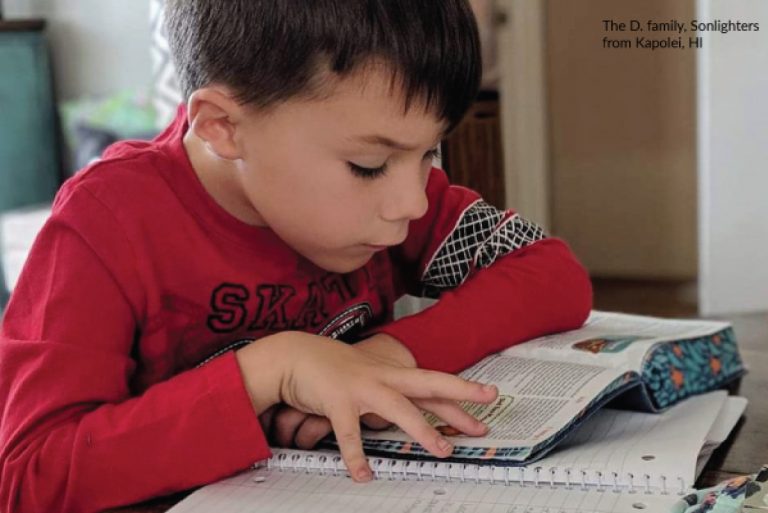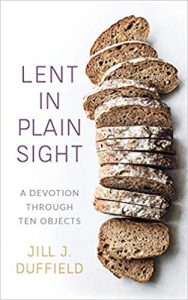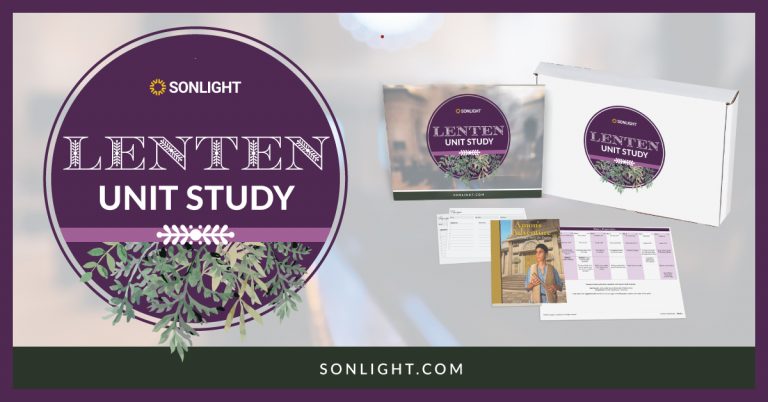Here are a few ideas to start meaningful Lenten traditions for your family. Following the format that we use when we design a Sonlight Unit Study, these suggestions include literature, crafts, and cooking.
A Devotional Spine for Your Lenten Study
This year I found a resource that I plan to use for my own Lenten devotional time: LENT IN PLAIN SIGHT: A Devotion through Ten Objects by Jill J. Duffield. The author focuses on ten ordinary objects in order to draw meaning from Jesus’s last days. With each object, the author focuses on scriptures that incorporate the object. For example, the week that focuses on bread, you read Exodus 16:4 where it talks about bread from heaven, and on the next day you read Mark 7:8 about the dogs who eat the crumbs under the master’s table.
Although this devotional not written for children, you can benefit from the devotional yourself and then share what you learn with your children, doing simple activities to reinforce what you read and learn.
Sadie’s Favorite Chicken
For example, the week you learn about bread you might bake a homemade no-knead bread. Or the day you read about bread crumbs, make breaded cutlets. My niece loves this chicken recipe so much that we now call it Sadie’s Favorite Chicken. I'm happy to share our recipe with you.
Ingredients
- 4 thinly-sliced chicken breast, pounded even thinner (or however many you need for your family)
- 1 egg, beaten
- 1 cup breadcrumbs (my family likes Progresso seasoned Italian breadcrumbs)
Directions
- Heat the oven to 350 degrees. Line a baking sheet with parchment paper.
- Beat the egg and place it in a dinner plate.
- Sprinkle the bread crumbs onto a paper towel and place it next to the dish with the egg.
- Place an empty dinner plate next to the bread crumbs.
- Dip a chicken cutlet in the egg, coating both sides. Let the egg drip in the dish before moving the chicken to the bread crumbs.
- Sprinkle bread crumbs on top of the cutlet and using the blade of your hand, pound the bread crumbs into the chicken. Flip to the other side and repeat the pounding.
- Place the breaded cutlet in the clean dish. Repeat until all the chicken is coated.
- Lay the cutlets on the prepared cookie sheet and either spray with olive oil cooking spray or brush olive oil on with a pastry brush.
- Cook for 10 mins then flip and coat with oil. Cook an additional 5-15 minutes, depending on the thickness of the chicken. Do not overcook or the chicken will be tough.
- Serve with slices of lemon.
Need more ideas?
The week you focus on oil, you could make an olive oil lamp (do an internet search for ideas) and make ladokouloura (Greek olive oil cookies.) Fasting is one of the practices during Lent. When Greeks fast, they abstain from eating animal products (meat, fish, dairy, eggs). Since these cookies are vegan, they make the perfect sweet treat during nistia (lent).
My family really enjoys cooking and eating, so I would probably find additional traditional Lenten or Easter recipes. For example, what are traditional foods from your heritage? What would your ancestors have made for the season? In Italy, we make chiacchiere (or cenci) for Fat Tuesday (they are fried in oil – very rich!) and pastiera napoletana for Easter.
Here are additional suggestions to consider during the Lenten season.
Shrove Tuesday & Ash Wednesday
Shrove Tuesday is the day before Ash Wednesday which marks the beginning of Lent. Shrove comes from the word shrive, which means to give absolution after hearing confession. It was the last day before the period of fasting began so it was an opportunity to use up and not waste those foods that couldn’t be eaten during Lent. This is where the tradition of eating pancakes on Shrove Tuesday originates because they included eggs, fat, and milk, which were forbidden foods. In the French-speaking world, the day is known as Mardi Gras or Fat Tuesday and in Italy and Spanish-speaking countries, it is known as Carnevale.
If you are not from a liturgical background but would like to experience some ancient traditions, find a church near you that will have an Imposition of the Ashes service. This is a solemn service where people are marked with ashes in the same manner that they were signed with the Cross in Baptism on the forehead.
5 Spiritual Disciplines for a Beautiful Lent
In celebrating Lent, we hope to foster a deeper spiritual awareness through the practice of disciplines that will allow us to more fully experience the joy of the Resurrection.
For music, listen to Sonlight’s Lenten playlist on Spotify.
1. Self-examination and Repentance
If you are not familiar with the typical disciplines practiced during this season, we begin with self-examination and repentance. (Joel 2:12, Corinthians 13:5, Psalm 139:23-24). Each person should think about how they have fallen short of the glory of God and repent (turn away from) any sin they can name in their lives. They should ask God to reveal any sin that is hidden from themselves.
2. Prayer
If you don’t already make it a practice to spend daily time in prayer, develop a new habit and plan to set aside some time to focus daily on prayer. (Philippians 4:6-7). Brainstorm with your children a list of people you can pray for.
For example
- Monday - family members
- Tuesday - neighbors
- Wednesday - friends
- Thursday - people serving in the armed forces or police
- Friday - people who work in the service industry
You might even reach out to these people before Lent begins and ask for ways you can pray for them. Then check back in after Easter for an update. Record their prayers on 3x5 cards as well as any answers.
3. Fasting and Self-denial
It is tradition to fast and practice self-denial during Lent because Jesus expected his followers to spend some time fasting. Jesus said to his disciples “When you fast…” (Matthew 6:16) implying that it will be done. With younger children you might suggest they abstain from a favorite food or activity. Brainstorm together what that might be. It should be reasonable but not easy. It should be something you should notice or miss. Try giving up something that has a stronghold in your life.
4. Bible Reading
Reading and meditating on God’s word is another common Lenten practice. (Joshua 1:8). There are scriptures in the book I mentioned above, or you can read the passages in Amon’s Adventure. Use the questions for reflection.
5. Almsgiving
Lastly, almsgiving or giving something away—the twin to giving something up. (Proverbs 19:17)
You can give away money, your time, or your resources to serve others sacrificially. One idea is to create a giving jar and donate the contents to a favorite charity. Children can deposit a coin for every act of giving they do in the family. Encourage them to think of various ways they can give kindness to their siblings: ask your sister to go first at lunch time, allow your brother to borrow the toy he asked about, tell mom that you will dry the dishes all week even if it isn’t your regular chore. Another idea is to shop for a food pantry. Let the children pick out something they would want to eat.
As you decide what new experiences you want your family to have during this time, start with some simple traditions. Give yourself grace when things don’t go according to plan. Small, meaningful moments will create a home culture focused on Jesus.
May these 40 days (not counting Sundays – they are little Easters) bring renewal to your heart. May you experience joy in your faith and your life as you are spiritually fed and nourished in your disciplines. Declare your dependence on God as you deny your cravings.










Thank you for sharing this. Kids should know the value of the Lent season, and celebrating Lent with them is a great way to help them get close to God.
Lent is a beautiful season that children can learn to appreciate!